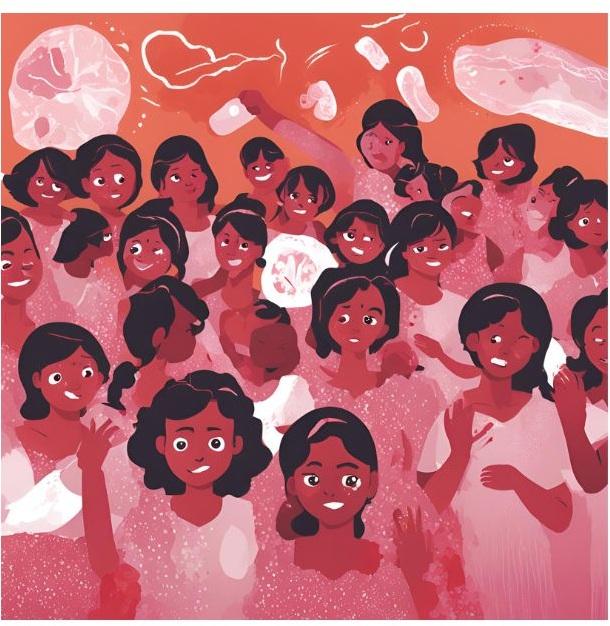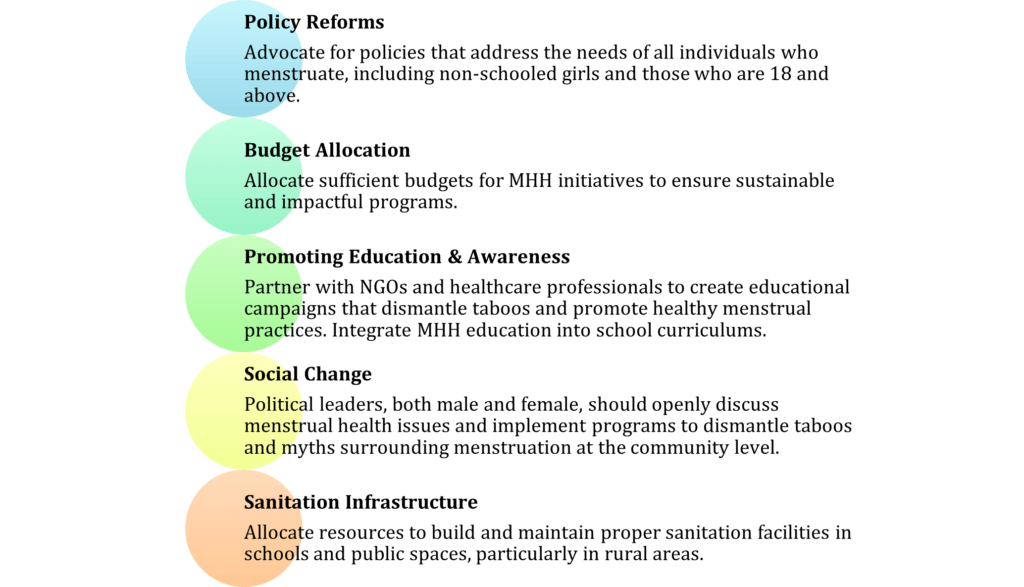
Imagine starting your period for the first time, completely unprepared and alone. Sadly, this is the reality for nearly half of all girls in India due to a pervasive culture of silence surrounding menstruation. Menstrual health is a critical issue often neglected in public discourse, and unfortunately, it’s not a priority in the current political election campaign either.
In low- and middle-income countries like India, this silence translates into a silent crisis: menstrual health and hygiene (MHH) struggles, especially for those who menstruate in rural areas. Limited access to period products, lack of proper sanitation facilities, and deep-rooted taboos create immense challenges. These challenges intensify during crises. The COVID-19 lockdown in India exacerbated the existing MHH struggles. Period Products were not added as a part of the essentials list in the first week of lockdown. After a huge outcry on social media, period products were eventually added as a part of the essential list. However, these restrictions disrupted supply chains, and social stigma surrounding menstruation further hindered access to essential supplies.
Hidden Heroes emerged during the COVID-19 pandemic
However, amidst this crisis, hidden heroes emerged. In Bihar, Shalini Jha and Mausam Kumari emerged as champions for menstrual health during the COVID-19 lockdown. Shalini’s Alharh organization tackled period poverty through pad distribution drives and social media campaigns that challenged stigma. Mausam, a healthcare worker, established a pad bank network in her Naxal-affected village, offering subsidized pads and fostering open dialogue about menstruation. Both navigated the pandemic by leveraging technology and collaboration – Alharh with online sessions and Mausam with a network to ensure product distribution despite lockdown restrictions. Their stories highlight the power of local solutions, innovation, and collaboration in driving change.
There are multiple such examples in India which played a huge role during the COVID-19 lockdown. Harshit Gupta’s Womenite raised funds to distribute 100,000 sanitary pad packs in Delhi, while Paree’s, a sanitary napkin manufacturer, distributed 80,000 units across Delhi and Punjab. Collaboration played a key role here too, with Rasoi-on-Wheels’ involvement supporting Paree’s distribution efforts. However, national challenges remained. Restarting production after lockdown restrictions eased was a slow process due to worker shortages and permit requirements. As Rajesh Shah, president of the Feminine and Infant Hygiene Association of India, highlighted, only 60% of factories were operational, and none at full capacity. Disruptions in the supply chain added another layer of complexity. These national hurdles underscore the importance of long-term solutions to ensure consistent access to menstrual hygiene products, even during crises.
Lack of strong political backing
While a handful of organizations stepped up during the crisis, their efforts highlight a crucial gap in menstrual health advocacy in India: a lack of strong political backing. Due to the underrepresentation of women and lack of male allies in policymaking spaces, menstrual health remains a neglected public health issue in India. While initiatives like Andhra Pradesh‘s free pad distribution for schoolgirls, PM Modi’s subsidized sanitary pad scheme are commendable, they often face limitations. The Central government has several schemes to promote menstrual hygiene among adolescent girls, including the National Health Mission that focuses on the age group of 10 to 19, National Guidelines on Menstrual Hygiene Management and the Beti Bachao Beti Padhao among programmes that raise awareness about menstrual hygiene.
Different states have their own schemes, but the primary focus of service delivery remains on the distribution of sanitary napkins. Maharashtra’s ‘Asmita Yojana’, Rajasthan’s ‘Udaan’, Andhra Pradesh’s ‘Swechcha’, Kerala’s ‘She Pad’, Odisha’s ‘Khusi’, Chhattisgarh’s ‘Suchita’, and Sikkim’s ‘Bahini’ all have provisions to distribute subsidised or free sanitary napkins to adolescent girls. Kerala and Karnataka governments have been distributing menstrual cups as a sustainable alternative to sanitary napkins. These initiatives have helped promote MHH countrywide but there are important challenges to equity. India has also come up with the new national menstrual health policy which primarily focuses on providing free period products and sanitation facilities to the individuals who menstruate.
All of these schemes face a few limitations. Firstly, their focus often excludes women outside the school system. Secondly, disruptions like school closures can hinder distribution. These programs, while appreciated, need to be expanded.
Time to prioritize MHH
Menstrual health needs a louder voice in political discourse. Political parties must prioritize MHH by:

India faces significant challenges in ensuring MHH for all. By prioritizing product access, education, social change, and policy reforms championed by political leaders, the country can break the silence and create a lasting impact on this crucial public health issue. The time for silence is over. Political parties must step up and play a leading role in ensuring dignity, health, and well-being for all individuals who menstruate in India.